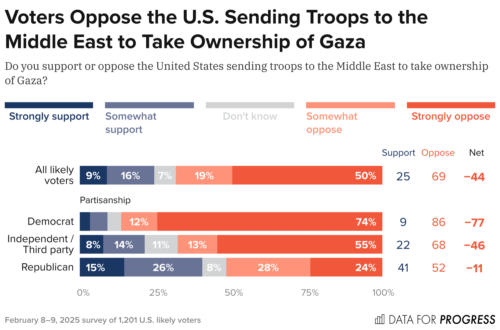
The National Interest Foundation Newsletter
Issue 273, February 14, 2025
Welcome to our NIF Newsletter. In this week’s edition, we provide analysis regarding the findings of a new American poll which illustrate the unpopularity of the idea that the U.S. take ownership of Gaza and various other places across the globe, examine how the latest announced U.S. weapons sales to Israel have drawn criticism due to numerous concerns, and look into Egypt’s plan to host an emergency Arab summit after the widespread backlash to Trump’s Gaza takeover proposal.
Editor: Bassam Tarbush
New American Poll Illustrates the Unpopularity of the Idea That the U.S. Take Ownership of Gaza and Elsewhere

President Trump’s Gaza takeover proposal was among the ideas that drew strong opposition in a recent Data for Progress (DFP) survey. (Photo from Getty Images)
A recent Data for Progress (DFP) survey has shed light on the significant level of opposition to President Trump’s Gaza takeover proposal, in addition to several other notable findings regarding Trump-floated ideas. Among the major takeaways is the finding that survey respondents strongly oppose Trump’s proposal to take ownership of Gaza and forcibly resettle its residents by a large margin of 37 percentage points, 64% to 27%. Furthermore, voters polled are also firmly against the potential notion of the United States sending troops to the Middle East in order to take ownership of Gaza by an even slightly bigger margin of 44 percentage points, 69% to 25%. In addition to Gaza, the majority of those surveyed for the DFP poll expressed opposition to the idea of the United States taking ownership of other places as well – Canada, Greenland, and the Panama Canal – albeit to differing degrees, and with Gaza receiving the strongest amount of objection out of the four.

Survey respondents strongly opposed the Gaza takeover proposal by a margin of 37 percentage points. (Photo from Data for Progress)
When asked if they supported or opposed Trump’s proposal for the United States to “take over” and “own” Gaza, and in doing so, forcibly displace the nearly 2 million Palestinians who live there into neighboring countries, about two-thirds of all respondents either “strongly opposed” or “somewhat opposed” this. Specifically, 47% of those polled expressed that they “strongly opposed.” Among Democrats, a whopping 85% opposed the takeover and forcible resettlement of residents, while only 10% supported it; a colossal 75% margin between opposition and support. The gap was also substantial when it came to those who identified as independents or third-party affiliated, as 40% more of these respondents opposed the proposal than supported. With respect to Republican survey participants, the results were a lot more mixed, with 46% supporting the idea and 43% opposing it; a miniscule margin of only 3 percentage points. The overall findings of strong opposition to the Trump Gaza takeover proposal are aligned with other recent polls on the issue, such as one conducted by CBS News which saw 47% of respondents say that the United States taking over Gaza would be a “bad idea,” compared to only 13% who deemed it a “good idea,” – the remaining 40% stated that they were “not sure.”

The idea of the United States sending troops to the Middle East to take ownership of Gaza elicited strong opposition as well. (Photo from Data for Progress)
Another major finding from the DFP survey was the extremely high proportion of respondents who opposed the idea of the United States sending troops to the Middle East in order to take ownership of Gaza. This was even slightly larger of a gap than the one regarding the Gaza takeover proposal. Nearly 70% of those polled voiced that they opposed the deployment of troops to the Middle East, with 50% of all respondents expressing that they “strongly oppose.” The wave of those who opposed in some capacity included 86% of Democrats, 68% of Independents/Third-party affiliates, and 52% of Republicans – a majority in each grouping and something which highlights the overwhelming opposition to this potential notion. This should come as no surprise given the American public’s growing weariness regarding the harmful effects of U.S. military entanglement in overseas conflicts – as witnessed over the preceding decades when looking back on what took place in countries like Iraq and Afghanistan. While Trump has been vague about the details of his proposal, he has tried to claim that no troops would be needed for it, however, military experts have outlined that it would clearly require the use of U.S. military personnel in some capacity.

In addition to Gaza, survey respondents also opposed the idea of the U.S. taking ownership of Canada, Greenland, and the Panama Canal, albeit to varying degrees. (Photo from Data for Progress)
The DFP survey also uncovered that Trump’s stances on “taking back” the Panama Canal, making Canada the 51st state, buying Greenland, and “redeveloping Gaza” into what he calls the “Riviera of the Middle East” are not what the majority of Americans want. Regarding all four places – the Panama Canal, Greenland, Canada, and Gaza – more survey respondents opposed than supported the idea of the United States taking ownership. The margin with respect to Gaza was the largest at 39 percentage points, 62% to 23%, while a similarly high gap was seen towards Canada at 34 percentage points, 61% to 27%. Over 50% opposed taking ownership of Greenland, compared to only around 30% who supported this. Meanwhile, the possibility of taking ownership of the Panama Canal was the closest of the four margins, as 46% opposed the idea and 41% supported it.
Overall, the survey findings in totality highlight the across-the-board disapproval of Trump’s suggested proposals for the U.S. to take ownership of various places around the world, and the particularly strong objection when it would also involve the forcible displacement of civilians and the deployment of American troops overseas.
Latest Announced U.S. Weapons Sales to Israel Draw Criticism Due to Numerous Concerns

In addition to bypassing Congressional review, the planned arms sales are believed to include the controversial Massive Ordnance Air Blast (MOAB) bomb. (Photo from Reuters)
Late last week, the U.S. State Department formally notified Congress of its intent to move forward with the sale of more than $8 billion in weapons to Israel. The decision has elicited unease due to a multitude of legitimate concerns. Firstly, in announcing the move, the Trump administration bypassed a Congressional review process that had been underway in a U.S. House committee. U.S. Representative Gregory Meeks (D-NY), a ranking member of the House Foreign Affairs committee, condemned the circumventing of Congress as a blatant disregard for long-standing prerogative and also outlined the Trump administration’s failure to provide sufficient documentation or justification for bypassing the Congressional review process. Secondly, and of particular alarm, the planned weapons sales are believed to include the controversial Massive Ordnance Air Blast (MOAB) bomb – often colloquially referred to as the “mother of all bombs” – a weapon capable of destroying underground bunkers and leveling vast areas. Peace advocates have been quick to point out that this raises serious concerns about the risk of further escalations in the Middle East and emboldening Israel to engage in potential strikes against Iranian nuclear facilities given the state of heightened tensions between Israel and Iran. Previous U.S. administrations had all refused to provide Israel with this munition, and thus, a change in policy could have a devastating and harmful effect on the prospect of peace and stability in the region. Lastly, the continual supplying of weapons to Israel in general despite overwhelming evidence of their use in Israeli war crimes and human rights violations is itself troubling as well.
In the most recent planned sale of U.S. weapons to Israel, the full scope of details is still unknown, however, several reports have cited the potential inclusion of MOABs. This is something that would be especially worrying at a time like this due to the current volatility of the Middle East, including the elevated tensions between Israel and Iran. MOABs are designed to be able to destroy deep underground facilities, such as those linked to Iran’s nuclear weapons production, and because of this, analysts suspect that Israel would use them to carry out these types of attacks targeting Iran’s underground uranium enrichment sites. Doing so would almost certainly lead to a direct and deadly confrontation between the two that could also drag in other countries like the United States. Observers have highlighted that, for years dating back to the early 2000s, Israel has requested MOABs but this has consistently been denied by the previous administrations of George W. Bush, Barack Obama, and Joe Biden. Now, if true, the change has prompted some former U.S. officials to express grave concern regarding the negative impact it would have on worsening conflict and hostilities in the region. The MOAB is also scary because of how it operates. The bomb explodes before hitting the ground, which creates a pressure wave that extends for miles in every direction, and would therefore undeniably kill and injure civilians. Organizations like Action on Armed Violence (AOAV) have condemned the possible MOAB sale to Israel, calling it “a dangerous escalation in the militarization of an already volatile region.” The group has documented how explosive weapons like MOABs affect civilians disproportionately in urban areas.
The announcement of the latest plan for additional weapons sales comes at a time of uncertainty and fragility, due to a delicate Gaza ceasefire deal that has yet to reach its second phase, in conjunction with President Trump’s widely condemned proposal for the United States to take over the territory and for Palestinians to be forcibly displaced. It also takes place after Trump recently lifted the hold on the supplying of 2,000-pound bombs to Israel back in late January. Originally, the Biden administration had paused the shipment over concerns of potential mass civilian deaths. The latest U.S. weapons sales are intended to be provided in two separate packages. The first would be for a myriad of munitions, guidance kits, and other related equipment. Among other things, it reportedly includes “166 small-diameter bombs, 2,800 500-pound bombs, and thousands of guidance kits, fuses, and other bomb components and support equipment” – all of which would begin shipping this year. The second package consists of 3,000 hellfire missiles and related equipment for $660 million. Those will not begin shipping until 2028, as the equipment requires further training from the United States military.
The United States accounts for roughly 66% of all the weapons sold to Israel – munitions which impartial experts contend have been used to commit egregious war crimes and human rights violations. This has led analysts to say that there are “no moral arguments that can justify the continued sale of weapons to Israel by states that respect the principle of the universality of human rights.” Yet, arms sales and transfers have persisted nevertheless, largely from countries like the United States, Germany, and Italy. What makes the repeated flow of weapons particularly problematic is the clear evidence of their use to indiscriminately target civilians and non-combatant infrastructure – something that has led the International Criminal Court (ICC) to issue arrest warrants against Israeli Prime Minister Netanyahu and his former defense minister. There is also an ongoing genocide case against Israel at the International Court of Justice (ICJ), however despite all of this, weapons sales have continued on a consistent basis.
Since the onset of the Gaza War back in October of 2023, a notable movement has taken shape both in the United States and globally calling for a curtailing of weapons sales to Israel. Many commentators have sought to draw attention to how the constant supplying of arms has enabled Israeli forces to carry out heinous war crimes and human rights violations. With that in mind, many rights groups have demanded that the United States and others end their complicity in this. Amnesty International, Human Rights Watch, Oxfam, and many more have documented the indiscriminate use of weapons against civilians in Gaza, and have thus initiated efforts aimed at pressuring governments around the world to stop arming Israel with weaponry that is knowingly being used in this manner.
Egypt Plans to Host an Emergency Arab Summit After Widespread Backlash to Trump’s Gaza Takeover Proposal

The emergency summit is slated to be held on February 27th in Cairo. (Photo from AFP)
Egypt announced earlier this week that it is convening an emergency Arab summit in Cairo on Thursday, February 27th to discuss developments in light of U.S. President Donald Trump’s widely condemned recent Gaza takeover proposal. Trump’s suggestion that the United States take ownership over the territory while also forcibly displacing Palestinians from Gaza into nearby countries such as Jordan and Egypt was met with sharp disapproval and backlash. The two aforementioned nations rejected the plan outright, with their foreign ministers and senior officials expressing steadfast opposition. Additionally, others in the region like Saudi Arabia have relayed their denunciation as well. As a result, Egypt is planning on hosting the summit to try and find possible solutions to push back against the outlandish proposal.
In the lead-up to the unveiling of the planned summit, Egypt’s foreign minister had communicated with several counterparts in the Arab world to mobilize regional efforts opposed to Trump’s plan and alternatives. One of the ideas believed to be discussed involves a major reconstruction initiative in Gaza and elsewhere across the region that would not displace residents of the Palestinian enclave. Egypt itself has voiced its intention to present a viable and comprehensive alternative. Although rebuke of the Gaza takeover proposal has been almost universal, government officials and diplomats are still taking Trump’s words very seriously and thus seeking to address them with the utmost urgency. In fact, the remarks have caused such a stir that it was reported last week Jordan was prepared to declare war on Israel in the event that Israeli officials attempted to forcibly expel Palestinians into its territory. Sources added that Jordan is eager for a peaceful solution, but that it is adamant borders will be closed if refugees begin to cross over.
Countries like Qatar, Saudi Arabia, and the United Arab Emirates are also in unison regarding rejection of the Trump proposal, and even Turkey has joined in as President Recep Tayyip Erdogan commented at a recent conference that “No one has the power to remove the people of Gaza from their eternal homeland that has been around for thousands of years,” and that “Gaza, the West Bank, and East Jerusalem belong to the Palestinians.” From a human rights perspective as well, the United Nations has warned that the displacement of Palestinians from the Gaza Strip would be illegal under international law and “tantamount to ethnic cleansing.” Furthermore, UN experts have stated that such a blatant violation would break the global taboo on military aggression and embolden other entities to seize foreign territories – something that would have devastating consequences for peace and human rights globally. They also point out that because the UN’s top court has ruled that Israel is an illegal occupier of the Palestinian territories, authorities would have no right to hand over control of Gaza to a foreign power or forcibly displace its citizens.
Regarding the elements of Trump’s widely criticized Gaza takeover proposal, the U.S. president and administration officials do not seem to be on the same page about what exactly it entails. It appears as though some have tried to mitigate Trump’s remarks, particularly those that have been condemned the most. Last week, White House Press Secretary Karoline Leavitt was questioned on certain aspects of the proposal, and argued that Trump’s plans for Gaza would be contrary to his “America First” policy, and thus tried to walk back some of the president’s comments by saying that the relocation of Palestinians would only be “temporary.” Her statements do not align with those of Trump who proposed “owning and rebuilding Gaza” and when questioned regarding allowing them to return to Gaza, he expressed that “No, they wouldn’t because they’re going to have much better housing, much better.” U.S. Secretary of State Marco Rubio made comments similar to those of Leavitt about displacing Palestinians and rebuilding Gaza stating “In the interim, obviously, people are going to have to live somewhere while you’re rebuilding it. It is akin to a natural disaster. What he (Trump) very generously has offered is the ability of the United States to go in and help with debris removal, help with munitions removal, help with reconstruction – the rebuilding of homes and businesses and things of this nature, so that then people can move back in.” Despite all of this, Trump continues to refer to permanent displacement, and therefore the mixed messaging between him and his administration officials gives off the vibe that even the president himself does not know the specifics of what his proposal would consist of.
This week, President Trump met with Jordan’s King Abdullah II in which the latter avoided directly contradicting Trump’s remarks on his Gaza takeover proposal, but instead alluded to an alternative plan soon to be revealed by Egypt. Meanwhile, reports have suggested that Egyptian President Abdel Fattah el-Sisi is unlikely to attend White House talks if Gaza displacement is on the agenda.
